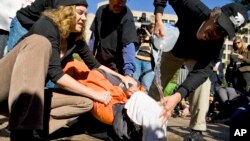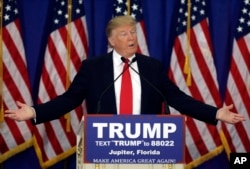The U.N. torture investigator voiced concern on Wednesday at calls by some Republican candidates in the U.S. presidential race to authorize waterboarding in interrogating detainees, noting that it was illegal under domestic and international law.
Republican candidate Donald Trump softened his stance on torture last Friday, saying he would not order the U.S. military to break international laws on how to treat terrorism suspects. The night before, he indicated he might order U.S. military to break the law on interrogation tactics, including waterboarding.
Trump's rival and number two in the Republican primaries, Senator Ted Cruz of Texas, said last month he would only allow limited use of the practice. He said he didn't believe waterboarding met the international definition for torture.
"Candidates in the United States have again discussed whether waterboarding is torture or not and have actually promised to bring it back and to bring even harsher techniques," Juan Mendez, U.N. special rapporteur on torture, told a news briefing in Geneva.
The Bush administration allowed the use of waterboarding - the practice of pouring water over a cloth covering a detainee's face to mimic the sensation of drowning - around conflicts in Iraq and Afghanistan. President Barack Obama banned it days after taking office in 2009.
"The Bush administration itself had withdrawn the torture memos when it was discovered that these things were happening as a matter of policy," Mendez said. "Even the Republican administration had already recognized that these things are illegal."
"They are illegal as a matter of international law, they are illegal as a matter of constitutional law in the United States, they are illegal as a matter of military law...and they are immoral anyway," he said.
Speaking as a U.S. citizen, rather than in his U.N. role, he said: "Yes, I think the damage in the standing of the United States as a law-abiding nation and as an example to other states to fight crime and terrorism within the strictures of the rule of law is very seriously damaged by this kind of rhetoric."
The Senate Intelligence Committee released a report in 2014, despite the objection of Republicans, that detailed what it called torture tactics used by the Central Intelligence Agency, including extensive use of waterboarding.






